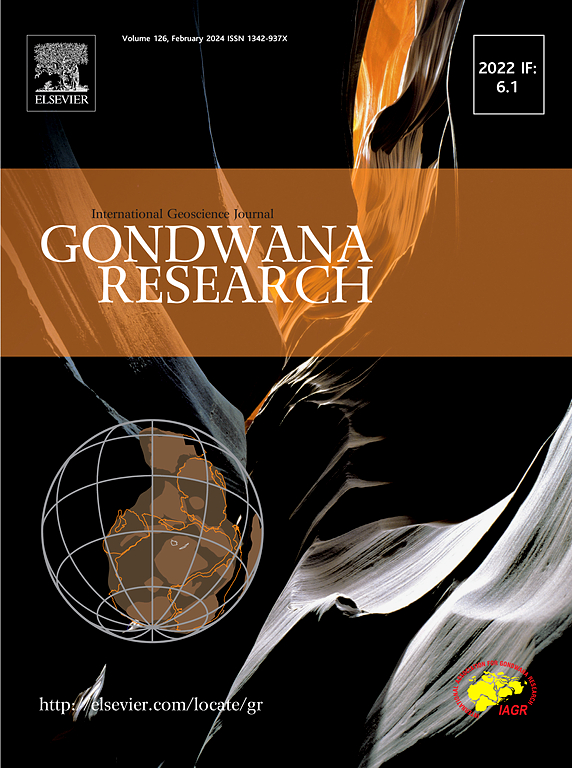南亚国家的可持续水资源管理实践:水资源、温度和生物能源对生态足迹的重要性
IF 7.2
1区 地球科学
Q1 GEOSCIENCES, MULTIDISCIPLINARY
引用次数: 0
摘要
水、食物和能源等基本资源的可持续性对人类福祉和社会发展至关重要。在东盟的背景下,理解经济增长、水资源、温度和生物能源之间的关系对于制定有效的政策至关重要。本研究考察了这些因素对生态足迹的影响,为该地区的可持续资源管理提供了见解。可持续的生态系统仍然是有效开发和利用这些资源的先决条件。利用先进的面板计量经济学模型,如CUP-BC (continuous - updated and Bias-Corrected)和CUP-FM (continuous - updated and full - modified),并辅以共同相关平均群(CCMG)和增强平均群(AMG)模型来确保鲁棒性。此外,研究还揭示了水资源与温度之间的正相关关系有助于生态足迹的增加。值得注意的是,生物能源系数为负且显著,表明对减少生态足迹有良好的贡献。该研究的可靠性突出体现在其跨多个模型的一致性。南亚国家的决策者必须优先考虑实施可持续的水资源管理方法,以便成功地解决与水资源和温度之间的相互关系相关的日益严重的生态影响。研究结果支持鼓励采用生物能源作为减少生态影响和促进环境可持续性的有效战略的建议。本文章由计算机程序翻译,如有差异,请以英文原文为准。

Sustainable water management practice in South Asian Countries: The importance of water resources, temperature, and bioenergy on ecological footprint
The sustainability of essential resources like water, food, and energy is critical for human well-being and societal development. In the ASEAN context, understanding the relationship between economic growth, water resources, temperature, and bioenergy is crucial for shaping effective policies. This study examines the impact of these factors on the ecological footprint, offering insights into the region’s sustainable resource management. A sustainable ecosystem remains a prerequisite for the efficient exploitation and utilization of these resources By utilizing advanced panel econometrics models such as CUP-BC (Continuously-Updated and Bias-Corrected) and CUP-FM (Continuously-Updated and Fully-Modified), and bolstered by common correlated mean group (CCMG) and augmented mean group (AMG) models to ensure robustness. Additionally, the study reveals that the positive relationship between water resources and temperature contributes to an increase in the ecological footprint. It is worth noting that the bioenergy coefficient, which is both negative and significant, indicates a favorable contribution towards the reduction of ecological footprint. The reliability of the study is highlighted by its consistency across multiple models. Policymakers in South Asian nations must give precedence to the implementation of sustainable water management methods in order to successfully address the increasing ecological impact associated with the interrelationship between water resources and temperature. Findings of the study support the recommendation to encourage the adoption of bioenergy as an effective strategy for decreasing ecological impact and promoting environmental sustainability.
求助全文
通过发布文献求助,成功后即可免费获取论文全文。
去求助
来源期刊

Gondwana Research
地学-地球科学综合
CiteScore
12.90
自引率
6.60%
发文量
298
审稿时长
65 days
期刊介绍:
Gondwana Research (GR) is an International Journal aimed to promote high quality research publications on all topics related to solid Earth, particularly with reference to the origin and evolution of continents, continental assemblies and their resources. GR is an "all earth science" journal with no restrictions on geological time, terrane or theme and covers a wide spectrum of topics in geosciences such as geology, geomorphology, palaeontology, structure, petrology, geochemistry, stable isotopes, geochronology, economic geology, exploration geology, engineering geology, geophysics, and environmental geology among other themes, and provides an appropriate forum to integrate studies from different disciplines and different terrains. In addition to regular articles and thematic issues, the journal invites high profile state-of-the-art reviews on thrust area topics for its column, ''GR FOCUS''. Focus articles include short biographies and photographs of the authors. Short articles (within ten printed pages) for rapid publication reporting important discoveries or innovative models of global interest will be considered under the category ''GR LETTERS''.
 求助内容:
求助内容: 应助结果提醒方式:
应助结果提醒方式:


